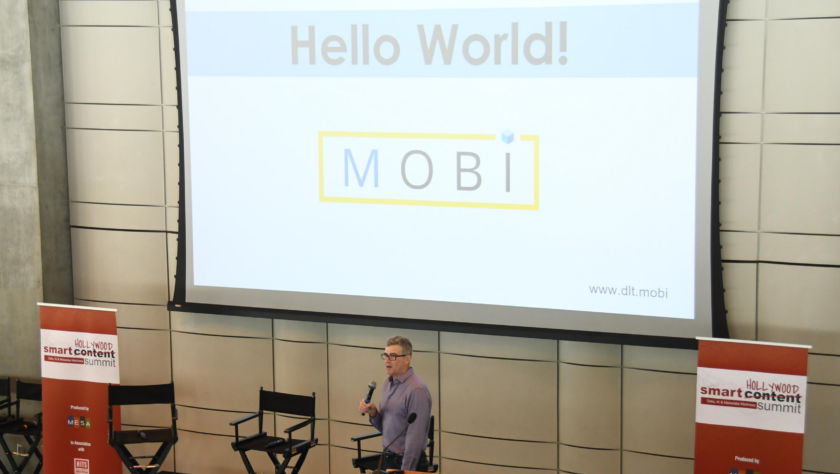
Smart Hollywood Summit: The Importance of Building a Blockchain Community
Blockchains, distributed ledgers and related technologies have the potential to revolutionize the way we track and manage natively digital assets and physical artifacts, but the technology only works when a minimum viable ecosystem already exists, according to Chris Ballinger, CEO and founder of the Mobility Open Blockchain Initiative (MOBI).
MOBI is a nonprofit foundation that was created to accelerate adoption of blockchain and promote standards for the benefit of the mobility industry, consumers and communities. After all, industry consortia are increasingly seen as necessary to nurture new ecosystems like blockchain and help realize the potential benefits.
Initially, MOBI had 35 companies, but it’s grown to 150 members, including BMW, Bosch, Ford, General Motors and IBM, Ballinger said Feb. 27 during the session “The Chain Reaction: Learnings from MOBI and Introducing DREAM” at the standing-room-only Smart Hollywood Summit.
The session featured an overview of MOBI and the Distributed Registry for Entertainment, Art and Media (DREAM), another group pioneering the relationship between intellectual property (IP) and technology to foster innovation in blockchain.
The session’s main topic was the “world’s oldest profession – no not that oldest profession; that one’s a sensitive topic in this town this year,” Ballinger joked. Rather, he said, “I’m talking about accounting.”
And blockchain really is an accounting system, despite his portion of the session being dubbed “A Ledger of Things for the Mobile Internet of Things” (IoT), he said. But a blockchain is a “special type of accounting system” that is “open, transparent, difficult to change and, therefore, very good for sharing between people who don’t trust each other and for reconciling transactions and for reducing costs around things where costs are very difficult to reconcile and very expensive,” he explained. And it’s a system that works very well for IP including digital rights and royalties, he added.
He pointed to a prediction by the World Economic Forum that, by 2025, 10% of global gross domestic product (GDP) will be stored on blockchains. “That means an awful lot of stuff has to move from whatever system it’s on right now to blockchains for that to be true,” he noted. He then pointed to a prediction by Netscape co-founder Marc Andreessen that blockchains will be “as disruptive and important as” the PC and the Internet.
“For many years, the knock on blockchains was that they weren’t being used,” he said, pointing to a claim that if they were “so important, how come no big companies were picking them up?”
But car maker BMW recently called blockchain one of its three “digitalization pillars,” along with artificial intelligence (AI) and IoT, he noted, adding: “This was the first time a big auto company, like a BMW, is standing up and saying” blockchain is “disruptive,” “critical” to its future and “you need to be paying attention” to it.
He also pointed to BMW’s comment that “the confluence of blockchain, IoT and AI enables every entity, i.e. person, machine, thing to have an identity, be intelligent and transact with other entities.”
In mobility, the “potential uses of blockchain are many,” including digital identity and vehicle history, supply chain tracking, and car/ride sharing, according to Ballinger.
Blockchain technology is “primitive” but “it’s getting better all the time,” so “that’s not the hard problem,” he went on to say. Instead, he explained: “The hard problem is the community. Blockchain is the ultimate network technology. You have to have a community to plug into.”
Like fax machines, smartphones and email, “unless everybody is on it… it really doesn’t do much good, he said, adding: “So, it’s about building the community, much more so than the technology…. Without the minimum viable community, you’re pushing a rock uphill because there’s nothing to plug into. Once everybody adopts, then the rock rolls downhill and it becomes expensive and painful for companies to stay out because everybody else is in, like the Internet and like email and like digitizing your business.”
The second half of the session started with Tram Vo, a founding member of MOBI and also a DREAM founder, pointing to the late David Bowie’s prediction many years ago about how significant the Internet would become. “I hope I’m a tenth as good as him when it comes to predicting the future of a new technology,” she said, noting she wasn’t a “technologist,” like Bowie or Smart Hollywood Summit attendees, but rather had a background in biochemistry and chemistry.
She went on to discuss the significant potential of blockchain, noting it’s already being used by Walmart to help it solve issues in the “complicated” food supply chain.
DREAM’s goal is the creation of an interoperable and secure global digital rights management protocol enabled by blockchain and related technologies, for the benefit of content creators (both individuals and organizations), consumers, communities and other stakeholders.
This year’s Smart Hollywood Summit was produced by the Media & Entertainment Services Alliance’s Smart Content Council with sponsorship by IBM Watson, MarkLogic, EIDR, Hammerspace, human-I-T, Independent Security Evaluators (ISE), KlarisIP, Testronic, FilmTrack, OnPrem, Mediamorph, RSG Media, Vistex, Vubiquity and Bob Gold & Associates.
To download audio of the presentations, click here and here.
